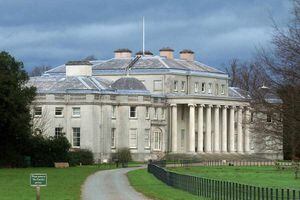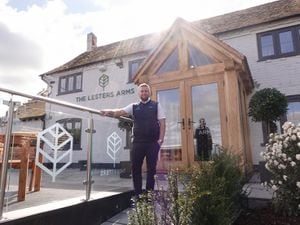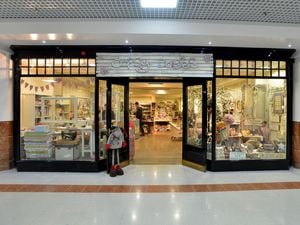Shugborough: National Trust manager talks plans for the future
Mark Agnew is in no doubt about the size of the task. Having seen the visitor numbers at Attingham Park treble over the past decade, he now has to repeat the feat at Shugborough Estate.

While Attingham in Shropshire has seen its visitor numbers rocket to become the National Trust's fourth most popular paid-for attraction in the UK, the charity is preparing to reopen Staffordshire's Shugborough to the public following several years of declining visitor numbers.
"Ten years ago we had about 154,000 visitors a year coming to Attingham," says Mr Agnew, the charity's regional manager for north Shropshire and east Staffordshire.
"During our last year, which finished at the end of February, we had 465,000 visitors. It has been a record-breaking year, up 65,000 compared to the previous year."
By contrast, it has been a difficult few years at Shugborough, which the trust has just taken over after 50 years being managed by Staffordshire County Council.
In 2011, when the council opened up the late Lord Lichfield's private quarters for the first time, visitor numbers reached 114,000.
However, since then there has been a period of steady decline, and last year just 84,000 people visited the estate on the edge of Cannock Chase.
Mr Agnew says the numbers will need to increase by at least threefold.
"At the moment, there is a backlog of conservation work of £2.8 million, and it is losing between £650,000 to £800,000 a year," he says.
"We need to get visitor numbers up to 250,000 a year to break even, it's a big risk for us."
The property, which had been in the Anson family for three centuries, was bequeathed to the trust in 1960, following the death of the fourth Earl of Lichfield.
In 1966 it was handed over to Staffordshire County Council on a 99-year lease, with the fifth earl, Patrick, leasing an apartment in the building for a nominal rent.
But the cash-strapped council controversially handed back the estate to the trust in November last year, with the loss of 28 jobs.
Mr Agnew admits it has been a difficult time for both the staff and volunteers at Shugborough.
"They went from having a lot of investment six years ago, when Lord Lichfield's private quarters were opened up and the place was really buzzing, to having very little money at all," he says.
"I think over the years, the council has done a very good job, but like many councils they have not got much money following the great recession."
Shugborough reopens on March 21 after nearly five months, and Mr Agnew says visitors will immediately notice some of the changes that have been made.
"We have tried to de-municipalise it," he says.
"It will be much more open, a lot of the fences have been removed, and we will have animals naturally grazing in the open fields."
Mr Agnew cites a 10-year time-frame to complete the transformation, and says people should realise that the changes will not happen overnight.
But he says Attingham Park, in Atcham, near Shrewsbury, is a shining example of what can be done with such an estate, and the aim is to bring Shugborough up to the same level.
At the moment, the trust is spending £3 million at Attingham, with a new cafe, restaurant and kitchen, as well as a biomass boiler which it hopes will reduce running costs.
"One of the most common asks from visitors, one of the biggest customer complaints for many years, has been that we need to improve our cafe, so we will be able to give customers what they are asking for," he says.
"It will also mean that we are able to serve hot food for the first time ever.
"We are going to be able to use the produce we grow in the walled garden, and our own venison."
Of course a growth in visitor numbers brings challenges of its own, as different people have different requirements.
"Some people are dog walkers, for example, and other people don't really like dogs, so you have to try to cater for everybody," he says. Indeed, catering for a diversity of tastes and viewpoints, is something the National Trust has had to increasingly had to come to terms with over the past couple of decades.
The trust, which operates properties and visitor attractions as varied as the back-to-back Victorian houses in Birmingham to the stunning moorlands of the Long Mynd, near Church Stretton, has seen its membership rocket from approximately three million in 2003, to about 4.5 million today.
But some of its attempts to appear more "relevant" have also caused controversy in certain quarters. Eyebrows were raised in 2013, when the trust decided to open the Big Brother house at the Elstree studios in London.
The trust's director-general, Dame Helen Ghosh also caused controversy when she suggested it might become more of a campaigning organisation in future.
"Like any other charity we cannot be political with a capital P, but that doesn't stop us from campaigning on issues that strike at the heart of what our charitable purpose asks us to do," she said two years ago.
"All the practical evidence we have at the trust shows that the biggest challenge we are now facing concerns the threat to biodiversity and wildlife."
She also said the trust would in future be placing greater emphasis on smaller, but historically significant, properties.
"It's things like the Beatles' houses in Liverpool or back-to-back houses in Birmingham," she said. "And our visitors are absolutely loving them."
But Mr Agnew says there have always been differences of opinion about what the trust should focus on, and the organisation is simply moving with the times.
"After the Second World War, there was the country house movement, and much of our work was about preserving and protecting them," he says.
"Then in the 1970s it was all about the Neptune campaign, which was focused on the coast and the countryside.
"Today, one of the biggest issues is about preserving our wildlife and countryside, and one of the biggest threats to that is climate change.
"At Attingham we have got a 4,000-acre estate, and we are looking to do what we can to preserve nature and wildlife, and all the different species.
"We're not a political organisation, but we exist for conservation and wildlife, and where we need to make our voice heard, we will do."
Whatever the controversies, the trust's properties in the West Midlands continue to do well. Benthall Hall in Broseley, near Ironbridge, was visited by 16,981 people in 2015/16, up from 6,812 in 2010/11. Over the same period, visitor numbers at Wightwick Hall in Wolverhampton grew from 53,087 to 83,796.
And Mr Agnew says as British society becomes increasingly built up, the role of the National Trust is as important as ever.
"As the population grows, a lot of new houses are going up, and it is very noticeable how many of these houses don't have gardens, or have very small gardens," he says.
"Everybody needs beauty in their life, it doesn't matter what your class, ethnicity or background is."





